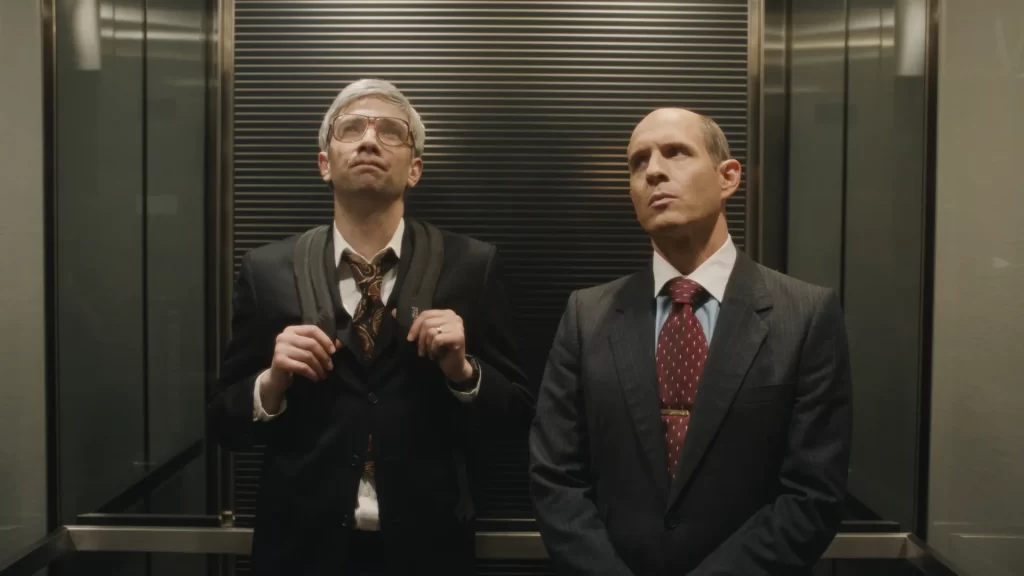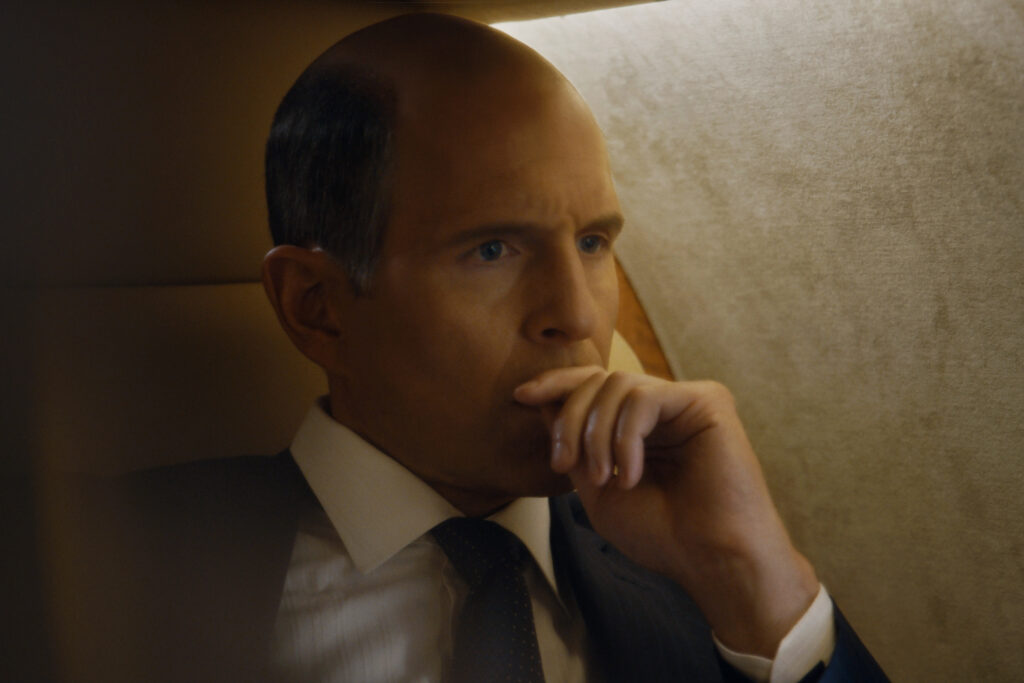
The very last thing you hear in BlackBerry—I promise I’m not spoiling anything—is the high-pitched whine of a dial-up modem connecting to the internet. To younger viewers, it’ll sound like an atonal clash of beeps and hisses, but for folks of a certain age, it’ll instantly transport you (OK, me) back to the mid-’90s: that nascent online era of Napster, Geocities, and Netscape Navigator. Directed by Matt Johnson from a script he wrote with Matthew Miller, BlackBerry isn’t purely a nostalgia piece, but an undeniable part of its appeal lies in its authentic evocation of a time when the worldwide web was a vast electronic frontier, full of hope and possibility. We had no clue what the internet might become, which meant it could become absolutely anything.
It turned into a lot of things, including (from an entrepreneurship perspective) a breeding ground for false promises, egomaniacal puffery, and unrealized dreams. Anyone could conceive of anything; the question was whether they could actually make and sell it. This inherent tension between imagination and execution—the challenge of transmuting far-flung ideas into actionable results—is familiar ground for storytelling, and BlackBerry’s tech-bubble saga of success and failure occupies well-trod territory. (The book it’s based on, by Jacquie McNish and Sean Silcoff, literally includes the phrase “extraordinary rise and spectacular fall” in its subtitle.) What makes the movie entertaining, aside from its irresistible contrast in personalities, is its bountiful specificity. It opens in 1996 Ontario and occasionally feels like it was actually shot then and there—less a modern docudrama than a magic portal into a time and place of wheezing hatchbacks, wanly lit offices, and first-person shooters.
Johnson’s filmmaking style commits to this found-artifact aesthetic with aggressive grubbiness. (Certainly he lacks the bravura flair that David Fincher brought to The Social Network, an unfair comparison the picture can’t help but invite.) In the early scenes, he deploys a sloppy handheld approach whose vérité bona fides don’t quite compensate for its overall slackness. But as the movie progresses, the camera grows more stable, and its settlement into point-and-shoot sturdiness mirrors the arc of its hero, who gradually morphs from scrappy innovator to celebrated founder to historical footnote—the guy who used to run BlackBerry.

Or co-run it. The heart of BlackBerry is its depiction of the combustible partnership between the company’s brilliant but awkward creator, Mike Lazaridis (Jay Baruchel), and its shark-suited finance guru, Jim Balsillie (Glenn Howerton). It begins with Mike and his closest friend, Doug Fregin (Johnson, pulling triple duty), pitching a thoroughly unimpressed Jim on a commingled email-and-phone device called… PocketLink. “You need a better name,” Jim says brusquely before kicking them out of his office—the first of many instances in which he combines good advice with bad manners.
Jim, in other words, is all business—a no-nonsense pragmatist who equates sensitivity with weakness, and who doesn’t hesitate to drop his Harvard pedigree into conversation. Mike, by contrast, is more of a perfectionist; while fidgeting anxiously in Jim’s vacant office, he whips out a paperclip and eliminates the white noise on the desk intercom, a sign of both his genius and his compulsivity. Mike has the brains for tech-world stardom but not the instincts; his fledgling company, Research in Motion, is still awaiting payment on its seemingly lucrative modem deal, and he demands recompense with all the authority of a fantasy football commissioner pleading with his friends to pay the league fee. So when Jim, motivated by his own recent professional setback (which stemmed from his rashness and superiority), offers to purchase a sizable stake in RIM in exchange for being named co-CEO, Mike recognizes their complementary strengths. Scientific acumen plus commercial savvy—what could go wrong?

Corporate movies that follow a particular three-act structure—the ascent, the plateau, the nosedive—tend to be more satisfying during their initial stages. BlackBerry is no exception, though its lacerating insight and sweaty intensity remain relatively constant. Still, the highlights take place early: An early meeting in New York where Mike and Jim attempt to pitch some skeptical Bell Atlantic executives (including one played by the always-welcome Saul Rubinek) is a thrilling exercise of timing and suspense, featuring a misplaced suitcase, an improvised proposal, and a landmark prototype keyboard.
Words like “thrilling” and “suspense” might seem antithetical to a picture whose core components—wireless servers! data limits! backdated stock options!—are less than robustly cinematic. But while Johnson’s technique isn’t exactly laced with verve, he still manages to maintain the movie’s energy without sacrificing its precision, in part because he gracefully tethers its story to its characters.

And not exclusively the main characters. The moral barometer of BlackBerry is neither Mike, whose ideological purity is inevitably corrupted (as visually signaled by a procession of increasingly garish silver wigs), nor Jim, whom Howerton portrays as an unstoppable force of nature. It is instead Doug, the film’s holy fool and Greek chorus. In the opening scenes, when RIM is a trivial hole in the tech-sector wall, it’s populated by jocular nerds who enjoy spending time at the office, tying up the phone lines for multiplayer campaigns and scheduling boisterous movie nights where they watch letterboxed VHS tapes of classics like Raiders of the Lost Ark; Doug is less their supervisor than their leader, cultivating a workplace environment of frivolity and camaraderie. Once the company goes global, with mammoth new facilities and a stern board of directors, this emphasis on quality of life disappears (Michael Ironside emerges as a glowering enforcer who threatens to fire employees on the spot), at which point Doug regresses from an enthusiastic coworker to a guy who—to paraphrase the famous scene from Office Space—doesn’t seem to do anything here.
The tragedy of BlackBerry, then, isn’t RIM’s ultimate collapse—as the timeline ventures later into the aughts, a vanquisher looms, and its name rhymes with “my phone”—but its temporary triumph. The movie’s lesson isn’t that nothing fails like success, but that success imposes a spiritual cost which often exceeds its financial rewards. The fattening of bank accounts is accompanied by the starvation of joy.

Then again, this is a matter of perspective. Certainly Doug, with his Wolfenstein T-shirts and totemic plungers, was happier when he was penniless. (Speaking of Wolfenstein, the film is stocked with so many appealing contemporaneous pop-culture references—all scrupulously compiled during the closing credits—it almost feels like cheating.) But Jim, who immediately clocks Doug as dead weight, is wired differently, to the point where each corporate conquest is simply a stepping stone to the next one. It isn’t so much that he wants to be rich; it’s that he craves victory—the thrill of defeating his opponents via deft maneuvering and superior intelligence. He is a man pathologically obsessed with confirming his own rightness, and Howerton—in a ferocious, wildly entertaining, deceptively astute performance—conveys the bottomless hole in his psyche that no amount of cash could ever fill.
If this sounds philosophically dispiriting, it’s important to note that BlackBerry is a very funny movie, with sharp pacing—in our current era of fact-based limited series, it’s nice to behold a full rags-to-riches-to-ravaged plot in a tidy two hours—and spiky dialogue. (A montage in which Jim’s army of buffoonish sales associates parades around town flaunting their fancy new phones—including one clown who holds it while playing tennis—is skillful in both its humor and its concision.) That it can’t quite maintain its level of tragicomic wit as its story grows darker is less an artistic failing than a necessary consequence of its trajectory. Besides, it seems excessive to demand that a movie be consistently hilarious, historically informative, and thematically trenchant all at once. What else do you want—a phone that sends emails, plays music, and navigates your road trip?
Grade: B+
Jeremy Beck is the editor-in-chief of MovieManifesto. He watches more movies and television than he probably should.
